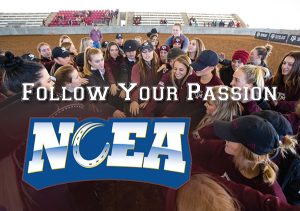NCEA – Follow Your Passion
Click here to read the complete article
110 – May/June, 2020
It’s no secret that life as a collegiate student-athlete is a balancing act. Between school, practice, and competition, it can be difficult to remain focused on the big picture: life after college. While many of us wish that college would never end, the reality is that we will all have to grow up, move on, and begin working towards our career-oriented goals. However, deciding what you want to do every day for the rest of your life can be an overwhelming decision when you’re only eighteen years old. In fact, I still remember the look on my parents’ faces when I confidently told them that their daughter, who had never taken an accounting course, was planning on majoring in accounting. It wasn’t until I took my first accounting class that I realized a career in accounting probably wasn’t going to work out for me…
When applying to college, prospective students are immediately asked to select a desired major. This leaves many students with little time to actually think about their respective career paths. When I first toured Texas A&M University, I remember being overwhelmed by the Hildebrand Equine Complex, the student-athlete dining hall, and the idea that I might one day have a locker with my name on it. I left my advising appointment knowing that I wanted to do something in the business school, but I hadn’t defined a clear path of what exactly I wanted to do. As a result, I ended up choosing a major that seemed to be the most familiar to me, rather than what ended up being the best fit.
After realizing that my primary degree plan wasn’t what I had expected, I felt lost. Switching majors can be difficult and result in a loss of earned credit hours, which can impact your athletic eligibility. Additionally, I had entered college with approximately thirty hours of credit through the completion of advanced placement courses taken in high school. As a result, I was unable to take many of the classes that allowed underclassmen to explore their interests in areas outside of their selected majors. Luckily, I was able to transfer from the accounting program into the management program within the Mays Business School and pursue a major that I felt best fit my personality, as well as my career aspirations.
However, my career path again shifted as I began to apply for summer 2020 internships. I quickly realized that I’d been so focused on my path within the business school that I had given little consideration to which industry I wanted to be involved in. Since my major was focused on Human Resources, I began applying for internships across a variety of industries that seemed like they might be a good fit. However, after receiving a few offers, I wasn’t satisfied with my options. So, I made yet another change and, as a management major, began applying for marketing internships. After receiving an overwhelmingly positive response, I was offered an internship with my dream company. The moral of the story is that, as a rising senior, I feel as if my career path has been refocused numerous times in ways that I would’ve never anticipated.
After talking with a few former NCEA athletes, I quickly realized that I wasn’t at all alone when it came to making changes to my long-term goals as I progressed through college.
Click here to read the complete article
110 – May/June, 2020











